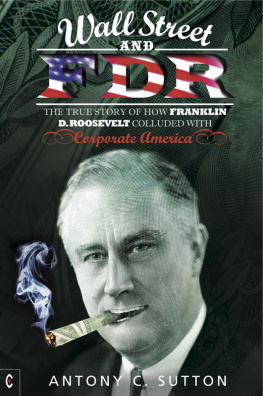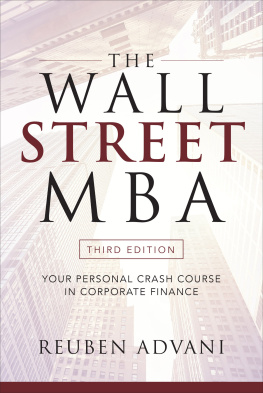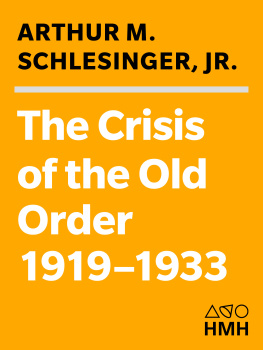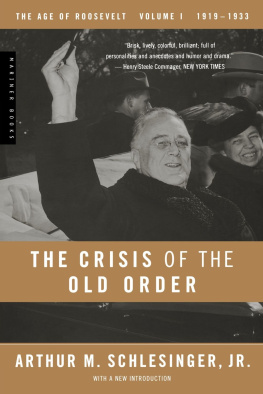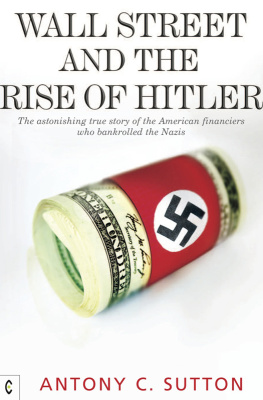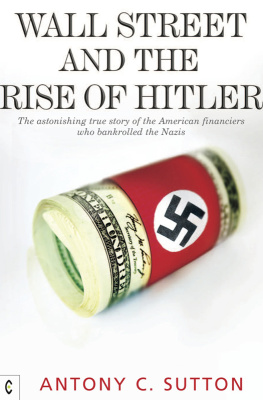Anthony C. Sutton - Wall Street and FDR: The True Story of How Franklin D. Roosevelt Colluded with Corporate America
Here you can read online Anthony C. Sutton - Wall Street and FDR: The True Story of How Franklin D. Roosevelt Colluded with Corporate America full text of the book (entire story) in english for free. Download pdf and epub, get meaning, cover and reviews about this ebook. year: 2014, publisher: Clairview Books Ltd, genre: Politics. Description of the work, (preface) as well as reviews are available. Best literature library LitArk.com created for fans of good reading and offers a wide selection of genres:
Romance novel
Science fiction
Adventure
Detective
Science
History
Home and family
Prose
Art
Politics
Computer
Non-fiction
Religion
Business
Children
Humor
Choose a favorite category and find really read worthwhile books. Enjoy immersion in the world of imagination, feel the emotions of the characters or learn something new for yourself, make an fascinating discovery.
- Book:Wall Street and FDR: The True Story of How Franklin D. Roosevelt Colluded with Corporate America
- Author:
- Publisher:Clairview Books Ltd
- Genre:
- Year:2014
- Rating:5 / 5
- Favourites:Add to favourites
- Your mark:
Wall Street and FDR: The True Story of How Franklin D. Roosevelt Colluded with Corporate America: summary, description and annotation
We offer to read an annotation, description, summary or preface (depends on what the author of the book "Wall Street and FDR: The True Story of How Franklin D. Roosevelt Colluded with Corporate America" wrote himself). If you haven't found the necessary information about the book — write in the comments, we will try to find it.
Franklin D. Roosevelt is frequently described as one of the greatest presidents in American history, remembered for his leadership during the Great Depression and Second World War. Antony Sutton challenges this received wisdom, presenting a controversial but convincing analysis. Based on an extensive study of original documents, he concludes that: FDR was an elitist who influenced public policy in order to benefit special interests, including his own. FDR and his Wall Street colleagues were corporate socialists, who believed in making society work for their own benefit. FDR believed in business but not free market economics. Sutton describes the genesis of corporate socialism - acquiring monopolies by means of political influence - which he characterises as making society work for the few. He traces the historical links of the Delano and Roosevelt families to Wall Street, as well as FDRs own political networks developed during his early career as a financial speculator and bond dealer. The New Deal almost destroyed free enterprise in America, but didnt adversely affect FDRs circle of old friends ensconced in select financial institutions and federal regulatory agencies. Together with their corporate allies, this elite group profited from the decrees and programmes generated by their old pal in the White House, whilst thousands of small businesses suffered and millions were unemployed. Wall Street and FDR is much more than a fascinating historical and political study. Many contemporary parallels can be drawn to Suttons powerful presentation given the recent banking crises and worldwide governments bolstering of private institutions via the public purse. This classic study - first published in 1975 as the conclusion of a key trilogy - is reproduced here in its original form. (The other volumes in the series are Wall Street and the Rise of Hitler and Wall Street and the Bolshevik Revolution.)
Anthony C. Sutton: author's other books
Who wrote Wall Street and FDR: The True Story of How Franklin D. Roosevelt Colluded with Corporate America? Find out the surname, the name of the author of the book and a list of all author's works by series.

